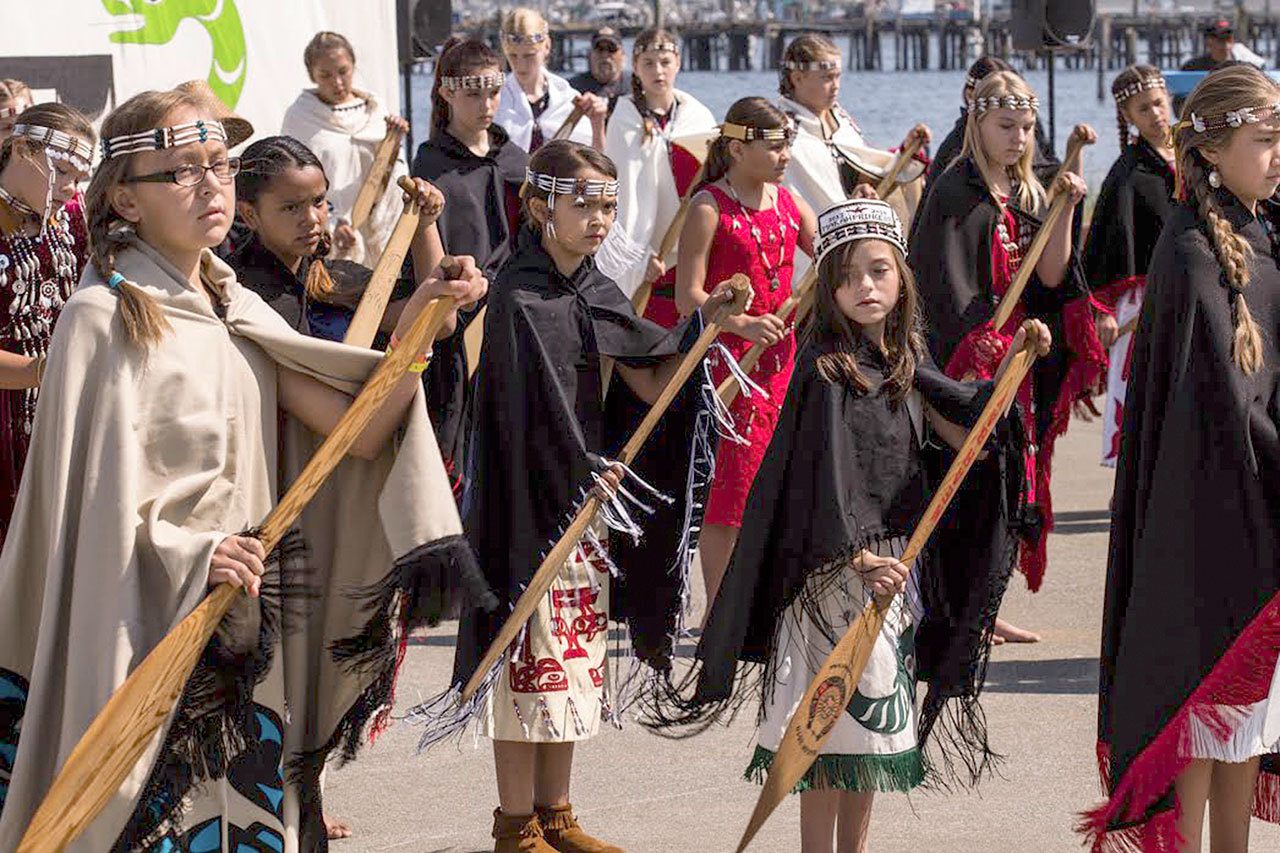NEAH BAY — Between 8,000 and 13,000 visitors are expected to participate in the 92nd annual Makah Days hosted by the Makah tribe today, Saturday and Sunday in Neah Bay.
During Makah Days, the members of the Makah tribe of Neah Bay gather and reunite with the members who have since moved away, to commemorate thousands of years of the Makah ancient culture and the anniversary of becoming citizens of the United States, according to the Makah website at www.makah.com.
The theme of Makah Days this year is “Honoring Our Grandmothers.”
“Our Grandmothers are strong, they are all-knowing and all-wise,” said Alana Claplanhoo, Makah Days chairwoman, in an email.
“They lift us up when we are down, they correct us when we are wrong, they are carriers of our history and teachers of our tradition.”
The event opens at noon today with a street fair on Bayview Avenue.
Traditional Makah games will start at 1 p.m. at the Front Beach Platform, youth canoe races at 3 p.m. at Front Beach, a talent show and 2016 Royalty Coronation at the Community Gym, fireworks at 10 p.m. and modern dance at 10:30 p.m.
A fireworks show over the bay will begin at about 10 p.m.
Festivities will continue Saturday beginning with a softball tournament at the high school at 8 a.m.
The street fair will open at 9 a.m., followed by a grand parade at 10 a.m.
After a flag raising at the grandstand at 11 a.m., a salmon bake will begin at noon near the senior center.
Dancing and other activities are planned throughout the afternoon and evening.
On Sunday, the street fair will open at 9 a.m. This will be followed at 10 a.m. with men’s and women’s canoe races at Front Beach, a salmon bake at noon and softball tournament finals at 3 p.m.
The tribe welcomes the pubic to join in the festivities as they celebrate with neighboring tribes from Washington and First Nations members from Vancouver Island in Canada.
“All events are open to the public and most are free; however, there are charges for modern dance and to buy a traditional salmon bake plate,” Claplanhoo said.
“This year, we have changed the menu to be a bit more traditional in that we are offering yellow fingerling potatoes — which are very similar to our Ozette potatoes — as well as homemade baked beans and buckskin bread along with sockeye cooked on a stick by the fire and fresh corn on the cob with watermelon,” she added.
”Wayne ‘Guvy’ Ward is our head fish cook, and chef Fran Tyler — a graduate of Le Cordon Bleu Western Culinary — is in charge of cooking and plating everything else.”
Visitors must purchase a $10 recreational use permit, good for one year, at the Makah Museum, 1880 Bayview Ave.; Washburn General Store, 1450 Bayview Ave.; or the Makah Tribal Center, 341 Bayview Ave.
“A recreational use permit is required for those not doing business on the Makah Reservation,” Claplanhoo said.
“The fee is minimal, is good for one year and helps fund our parks and recreation department.”
Makah Days traces its existence to Aug. 26, 1913, the day the first American flag was raised in Neah Bay.
The flag was raised by Dr. Joseph K. Dixon, who was on a mission to raise Old Faithful above every Native American reservation in the country as part of the Rodman Wanamaker Expedition of Citizenship, according to a news release.
President Woodrow Wilson addressed the gathered audience during the ceremony via phonograph recording. Albert Irving, James Peterson and Luke Markishtum were the original raisers of the American flag and their descendants carry out that honor each year, according to the release.
“Our first flag raising was before we were allowed to become citizens,” Claplanhoo said.
“Until that time, we were considered aliens in our own country.”
According to historians, American citizenship was granted to tribes in 1924 as part of the Indian Citizenship Act, which was signed into law by President Calvin Coolidge in recognition of those who had served during World War I.
This landmark event, combined with the Makah Tribe’s annual flag raising tradition, became the catalyst for Makah Days, which has been celebrated every year since — a total of 92 years, according to the news release.
The event initially was celebrated almost entirely by traditional Native American songs and dances, according to the release, and started with the arrival of Makah members from area villages. Some would come by foot, others by horse and still more by canoe, according to the release.
Dancing would continue late into the night until a celebratory feast was served.
The traditional meal consisted of baked salmon, seafood, buckskin bread and potatoes baked under the hot sand beneath an open fire.
Bone games and canoe races also were a part of the celebration.
________
Features Editor Chris McDaniel can be reached at 360-452-2345, ext. 56650, or at cmc daniel@peninsuladailynews.com.

